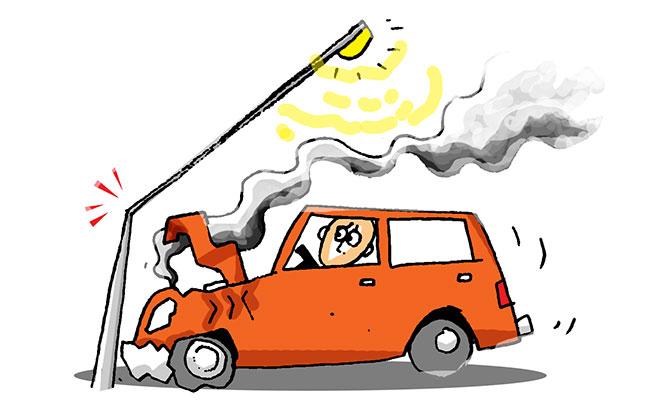
How do insurance companies decide how much to charge people for driver's insurance? Besides the initial packages that are offered, auto insurance companies often offer policy discounts to certain groups. For young drivers, an average Good Student Discount could save you around 7% of your driver's insurance. Each company uses policy economics, which involves using the data of grades, test scores, and accidents, to set their own guidelines.
This package incentives students to achieve in school in order to save money. The insurer will want to see proof of good grades or SAT scores in the top 20% of the national average. Since parents want to save money, they will encourage their children to fit into these brackets. For companies, this policy is beneficial because the good students they insure may be less likely to get into accidents, and thus save payout money. Although this may seem like a good deal for all parties involved, the opportunity cost of trying to get these deals is less time and practice on the road which may actually result in more accidents.
Since the policy is largely reliant on previous data and the theory that if someone is more responsible when they are studying, they will be more responsible when they are driving, there is also a danger of fallacy of composition. Being a good student does not mean they will be a good driver since correlation does not mean causation.
However, if this package is beneficial to you, make sure to bring your transcripts to the insurer when you set up your auto insurance plan.
Kagan, Julia. “Good Student Discount.” Investopedia, Investopedia, 18 Nov. 2019, www.investopedia.com/terms/g/good-student-discount.asp.
This package incentives students to achieve in school in order to save money. The insurer will want to see proof of good grades or SAT scores in the top 20% of the national average. Since parents want to save money, they will encourage their children to fit into these brackets. For companies, this policy is beneficial because the good students they insure may be less likely to get into accidents, and thus save payout money. Although this may seem like a good deal for all parties involved, the opportunity cost of trying to get these deals is less time and practice on the road which may actually result in more accidents.
Since the policy is largely reliant on previous data and the theory that if someone is more responsible when they are studying, they will be more responsible when they are driving, there is also a danger of fallacy of composition. Being a good student does not mean they will be a good driver since correlation does not mean causation.
However, if this package is beneficial to you, make sure to bring your transcripts to the insurer when you set up your auto insurance plan.
Kagan, Julia. “Good Student Discount.” Investopedia, Investopedia, 18 Nov. 2019, www.investopedia.com/terms/g/good-student-discount.asp.


This is very interesting to read about. When I got my driver insurance, I had to do an additional online class to get money off. Different companies try to incentivize their customers in different ways. Again, there are problems with this policy. It is more likely to benefit those who are already affluent - mostly students with access to the best educational resources and students who have parents that can buy them a car in the first place.
ReplyDeleteI find that incentivation program really interesting. Car insurance is something I feel applies to a large number of people, and with high schoolers being stereotyped as reckless drivers, this program could work to change that. The point you made about the opprotunity cost is something that in no way crossed my mind but was a good point to consider.
ReplyDeleteI found this article really interesting. I knew that car insurance companies found a way to cleverly adjust rates by citing the correlation between good grades and good driving, but I didn't factor in the opportunity cost of this program. I also think that an opportunity cost of the additional pressure on grades would be mental health or mental state, which also impacts driving as you are less able to make smart decisions when you are angry or upset.
ReplyDeleteUsing cheaper car insurance as an incentive to get good grades is really interesting, especially since teenagers have the highest insurance rates. I found it even more interesting because you factor in opportunity cost, which is something I never thought about with the good student discount.
ReplyDeleteThis article is really interesting, I would have never thought of car insurance to be a way to incentivize. I also really liked how you mentioned opportunity cost–how perhaps this incentive may cause more accidents since students will prioritize spending time on improving grades rather than learning how to drive better. I also think that perhaps this incentive may not individually motivate students as much as expected, since parents are the ones who mostly pay for their insurance.
ReplyDeleteI think there's an interesting nuance to the applicability of "correlation != causation." While yes, getting a good SAT score doesn't logically imply you are a good driver, there is some predictive power there. To compete and offer the lowest prices, insurance firms must use as much information as legally allowed to price out competitors who don't exploit that same information. If SAT scores can predict driving performance, they should use it.
ReplyDeleteHowever, this post quite incisively brings up the concept of this as an incentive to perform better on the SAT. I think that if someone studies extra hard for the SAT to insurance costs, rather than out of general conscientiousness, it ceases to have predictive power with respect to driving quality. This is a classic instance of Goodhart's law (https://en.wikipedia.org/wiki/Goodhart%27s_law): when a measure becomes a target, it ceases to be a good measure.
In short, correlation != causation, but it does imply predictive capability, absent incentivized intervention.